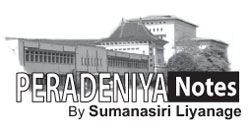
Although some members of the UPFA government indicated vaguely a few months ago that Emergency would be lifted fully at the end of this year, the President’s announcement that he and his government had decided to do so with immediate effect and depend on normal laws to maintain law and order came at an unexpected moment and as a result, it has received a mixed response.
In my opinion, the lifting of Emergency regulation in itself is a commendable and appropriate action since it has been a known fact that Sri Lanka had ruled since 1971 not by ordinary laws but through emergency regulations except for a couple of very brief intervals. Many have surmised that the proximate cause for lifiting Emergency is the forthcoming UN human rights session in Geneva.
Of course, we have to keep in mind that the government since the beginning of this year has relaxed emergency regulations and informed the people that it would lift it fully when the time was opportune for such a decision. It has been customary for many NGO people to think that all good things come because of the pressure of the so-called international community! Moreover, many human right activists have understandably raised an objection that lifting of emergency in itself does not lead to an improvement of the situation as the other draconian laws such as the Prevention of Terrorism Act (PTA) are still in operation and PTA can be used as a supplement for Emergency regulations. Nonetheless, one should also understand that reversing the process that began in the early 1970s and gathered so much dirt since the late 1970s is not an easy task for multiple reasons. The continuous rule under Emergency has created a new system substantially different from the system that existed in the pre-1971 period. As a result, one may argue that the removal of those laws should be done with utmost care and that the focus should be on gradual transition to a system that is just, democratic and humane.
Although a transition to a just society needs the repeal of draconian laws and regulations, one should not forget that the rules and regulations are fundamentally symptomatic of the complex socio-economic and political process and context and the relationship between context and laws are dialectical. Hence whether the lifting of Emergency is a step in the right direction or it will not make a significant difference depends on so many variables. Here, one important and interesting point is that all elected governments since 1970 have developed authoritarian tendencies at an increasing rate. This may be attributed to many factors. First, it is systemic as the authoritarianism is inherent in constitutions of 1972 and 1978.
The executive presidential system has given one person immense power and the political party system has been adapted to the whims and fancies of the presidential system. Secondly, internal political conflicts stemming from redistribution, recognition and representation injustices have led governments since 1971 to resort to emergency laws and regulations. The Emergency laws enacted in the late 1950s were widely used and new law called PTA were enacted in the late 1970s. Thirdly, in the cultural-ideological sphere, authoritarianism receives the support of the larger section of the people for various reasons. This became crystal clear when the majority of Sinhala masses supported the Emergency and other draconian laws while they were being used to suppress Tamil militancy.
It has become an accepted fact that a certain degree of authoritarianism is required to achieve economic development and to preserve the territorial integrity. These or similar tendencies are inherent in many countries in the world today including some of the so-called Western democracies. This has led an Italian political philosopher, Giorgio Agamben, to argue that the ‘state of exception’ is, in fact, the normal situation in the current political landscape. Agamben opines: “One of the elements that make the state of exception so difficult to define is certainly its close relationship to civil war, insurrection, and resistance. Because civil war is the opposite of normal conditions, it lies in a zone of undecidability with respect to state of exception, which is state power’s immediate response to the more extreme internal conflicts” (Sate of Exception, Chicago: Chicago University Press, 2005). This zone of undecidability has, in fact, created a novel option for the ruling class and the state to generate permanently such a situation so that the rule through emergency may be legitimised with reference to exceptional, not normal situations. He further notes: “Since then, the voluntary creation of a permanent state of emergency has become one of the essential practices of contemporary states, including so-called democratic ones” (ibid).
Hence, the basic issue that we have to deliberate at this moment is how the systemic, political and cultural-ideological situation that nurtures the creation of the state of exception could be transformed. In this regard, one of the key obstacles is the discursive violence practised by the people who tend to think that the Western system is the model that we should adhere to in post-colonial context. The lifting of Emergency is a step forward. I also submit that the PTA should also be repealed. However, if one believes that a just and humane system can be fostered just by changing the legal system without touching the systemic issues, one is making a big mistake. Similarly, if by lifting Emergency the UPFA government seeks to effect some cosmetic changes without addressing basic issues, such an attempt is doomed to failure.
The writer teaches political economy at the University of Peradeniya.
E-mail: [email protected]